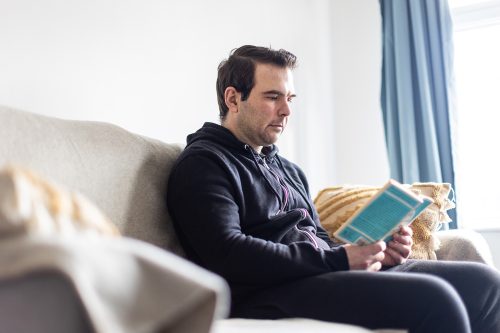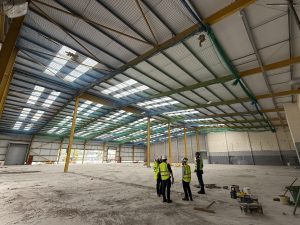£23m investment into homelessness property funds helps move 530 people into sustainable accommodation

More than 500 people in Bristol have been moved into more sustainable accommodation thanks to the efforts of two homelessness property funds.
More than £23m has been invested by social impact investor Resonance into purchasing and refurbishing a total of 136 properties across Bristol since 2016, including in Southmead, Henbury, Bedminster and Fishponds, in a bid to reduce the number of individuals sleeping rough or living in temporary accommodation in the city.
Working with local charity, Developing Health & Independence (DHI), people are being encouraged to rebuild their lives by combining a stable, secure home with wraparound support that helps them overcome issues, gain new skills and find employment.
Darren Jones, MP for Bristol North West and Chief Secretary to the Treasury, met some of the key individuals behind the fund, also taking time to talk to a tenant who is in the process of turning his life around.
Bruno – who has a long history of rough sleeping, living in temporary accommodation, poor mental health and drug use – discussed his experiences of homelessness and the difference a stable home has made to his life.
Since moving into his new home in September, he has made huge progress. With support provided to him by DHI and his support worker Esther, he is becoming abstinent from drugs and his mental health has improved.
Bruno is also now involved with a variety of activities, including a cookery and a forest group, and is about to start volunteering at FareShare, a charity that redistributes surplus food to community groups and charities.
Darren Jones said: “It was inspiring to meet Bruno and see how social impact investing can change people’s lives. This government is committed to creating the right environment for impact investment to unlock its potential for individuals and communities, here in Bristol and elsewhere around the country.”
Through its homelessness property funds, Resonance attracts capital from institutional investors, such as pension funds and Local Authorities.
It uses this funding to acquire properties, refurbishing them to a high standard, improving their energy efficiency and leasing them to expert housing partners, such as housing associations and homelessness charities.
Tenants in Bristol receive support with their health, wellbeing and employment and training opportunities from Developing Health & Independence.
Some have more complex and higher support needs and experiences of rough sleeping. DHI supports these tenants to reintegrate back into communities and develop the skills and resilience to live healthier, more independent lives through the government’s Rough Sleeper Accommodation Programme (RSAP) – a project that supports people who have experienced rough sleeping into longer-term accommodation and stability.
Daniel Brewer, CEO of Resonance, commented: “Bristol has the highest rate of homelessness in the South West, with 15871 households in the city living in temporary accommodation.
“At the same time, many councils are grappling with mounting financial pressures and temporary accommodation spending has risen to £2.29bn2 a year.
“This is not sustainable, and we have to be innovative in our thinking. Our homelessness property fund works across the UK and is one way where we can offer an immediate solution to bringing houses back to life that can then be used to give people safe places to call home.”
He continued: “We were able to show Darren Jones the human impact of our funds by arranging a visit with Bruno, who eloquently explained how living in proper accommodation gives you the platform to make positive changes in your life.
“Our homelessness property funds are an example of how social impact and local institutional investment can make a difference to an area’s housing crisis and provide positive outcomes for tenants, whilst also saving local authorities and central government valuable money.”
Rosie Phillips, CEO at DHI, added: “Bruno demonstrates what people can achieve when they have a place to call home. We know only too well the impact that good quality, affordable housing has for people, and how social investment can make a significant difference.”









